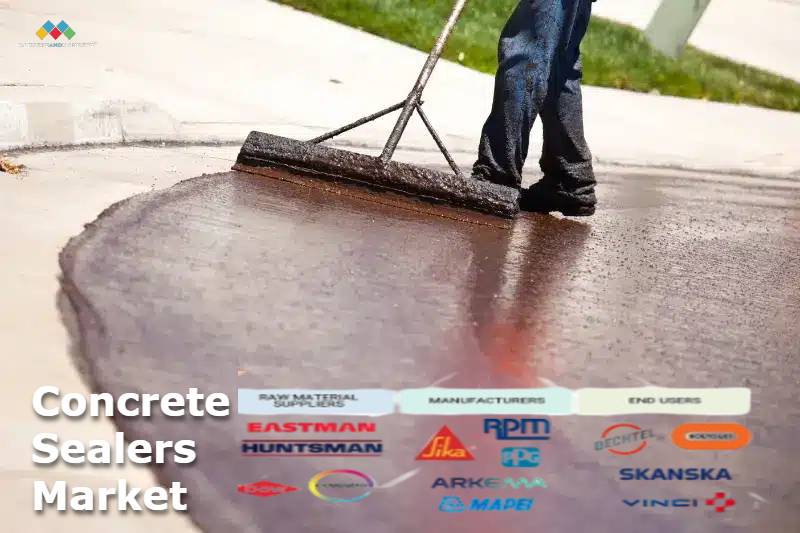As the construction industry continues to embrace long-term durability and sustainability, the role of concrete sealers has become increasingly vital. These protective coatings are no longer just a finishing touch—they’re a strategic investment that enhances concrete’s resilience against moisture, chemicals, freeze-thaw cycles, and wear.
The global concrete sealers market is expected to grow from USD 2.03 billion in 2024 to USD 2.95 billion by 2030, at a CAGR of 6.4%. This growth is a direct result of increased infrastructure investments, rising demand for aesthetically durable surfaces, and innovations in sealing technology.
In this blog, we spotlight the key players in the concrete sealers market and analyze what sets them apart.
Why Concrete Sealers Matter
Whether it’s a highway, warehouse floor, patio, or decorative surface, concrete is exposed to the elements and stressors. Without proper sealing, it becomes vulnerable to cracking, erosion, and staining. Sealers not only improve the longevity of surfaces but also enhance appearance and reduce long-term maintenance costs.
From penetrating sealers that guard against internal water damage to film-forming sealers that deliver a glossy finish, innovation in this space is being led by industry frontrunners.
Leading Concrete Sealer Companies
Leading concrete sealer companies like Sika AG, RPM International, Mapei, and Prosoco are setting industry benchmarks with advanced sealing technologies. These companies offer durable, sustainable, and high-performance solutions tailored to both residential and commercial construction, ensuring long-lasting protection and aesthetic enhancement of concrete surfaces across global markets.
1. Sika AG (Switzerland)
Sika is a global leader in construction chemicals, with a robust portfolio of concrete sealing solutions. Known for reliability and innovation, their sealers are used in both commercial and industrial applications. The company emphasizes sustainability with low-VOC and high-performance solutions.
2. RPM International Inc. (USA)
RPM owns brands such as Euclid Chemical, Tremco, and Rust-Oleum—all of which are trusted names in concrete protection. Their sealers cater to large-scale construction, decorative concrete, and waterproofing needs, making them a versatile player in the market.
3. Mapei S.p.A. (Italy)
A key name in construction adhesives and sealants, Mapei’s sealers are engineered for architectural aesthetics and high-load environments. Their eco-conscious R&D continues to gain traction across European and North American markets.
4. Prosoco (USA)
Known for its focus on surface performance, Prosoco offers specialized sealers that protect concrete while allowing vapor permeability. Their solutions are widely used in green building projects and LEED-certified structures.
5. PPG Industries Inc. (USA)
With decades in protective coatings, PPG has expanded into high-end concrete sealers that serve industrial and commercial infrastructure. Their sealers are often chosen for their UV resistance and long-term clarity retention.
6. BASF SE (Germany)
Through its construction chemicals division, BASF offers sealers that strengthen and protect concrete in harsh environments. The company leverages chemistry to solve real-world construction challenges, making their sealers highly adaptable.
7. Sherwin-Williams (USA)
While primarily known for paints, Sherwin-Williams also produces industrial-grade sealers that provide both aesthetics and strength for concrete flooring, especially in retail and manufacturing spaces.
8. Arkema (France)
Arkema’s construction solutions include advanced sealing technologies with a strong emphasis on low environmental impact. Their acrylic-based sealers deliver performance and compliance in regulated markets.
Market Trends That Are Reshaping the Landscape
- Sustainability Focus: With increasing environmental regulations, low-VOC, water-based, and biodegradable sealers are gaining traction.
- Nanotechnology Integration: Companies are investing in nano-sealers that penetrate deeper and resist microbial growth, abrasion, and water ingress.
- Decorative Concrete Surge: The rise in stamped, stained, and polished concrete has opened new demand for sealers that enhance color vibrancy and gloss while offering surface protection.
- Smart Sealing Solutions: Sealers with smart additives are being developed to provide temperature regulation, self-healing properties, and anti-slip features.
Strategic Takeaways for Industry Experts
- Invest in Quality: As performance standards tighten, partnering with companies that offer tested and certified sealing products ensures project durability and compliance.
- Follow the Innovators: Companies like Sika, Prosoco, and BASF are setting benchmarks in smart sealing technologies—stay updated with their new product lines.
- Consider Regional Needs: Climate, traffic load, and aesthetic requirements vary; choose sealers accordingly from brands that cater to local regulations and conditions.
Conclusion :
Concrete sealers are no longer an optional part of the construction toolkit—they’re a necessity for quality, longevity, and sustainability. Whether you’re a contractor, project manager, or materials specifier, aligning with reputable concrete sealer companies ensures that your projects stand the test of time—both structurally and aesthetically.

